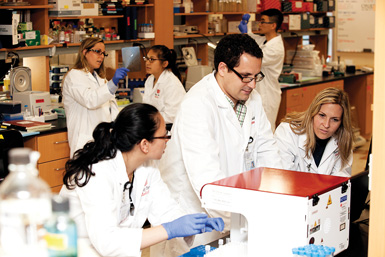Those new REACH awardees are:
- The Long Island Bioscience Hub: Stony Brook University, Cold Spring Harbor Laboratory, Brookhaven National Laboratory
- The University of Louisville
- The University of Minnesota
REACH is based on an initiative created by the NIH’s National Heart, Lung, and Blood Institute (NHLBI) called the NIH Centers for Accelerated Innovations (NCAI). The hubs will be funded at $9 million over three years.
The goal of REACH is to help speed the translation of basic biomedical discoveries into commercial products such as new drugs, devices, and diagnostics to improve patient care and enhance health.

Samuel Stanley Jr., MD, president of Stony Brook University, believes these efforts will accelerate the yield of new healthcare innovations: “This partnership will advance New York State’s ever-expanding bio-based entrepreneurial ecosystem with new discoveries that fuel new company formation and jobs in biotechnology,” he says.
Clinton T. Rubin, Ph.D., principal investigator, distinguished professor, chair of the Department Biomedical Engineering, and director of the Center for Biotechnology, regards the award as recognition by the NIH in the “great potential for translational research and technology development that resides in our region.”
Stony Brook University, Cold Spring Harbor Laboratory, and Brookhaven National Laboratory have a demonstrated capacity for bioscience innovation that has advanced the course of biomedical science and contributed to improved healthcare through FDA-approved therapies, new medical devices, and new company formation including New England BioLabs, OSI Pharmaceuticals, Collagenex, Pharmacopeia, and Exogen.
These centers are a unique public-private partnership whose objective is to change how to identify and develop innovations with scientific and commercial potential. The effort utilizes industry-style project management to arrive at technologies that are poised to launch. With the addition of the REACH, NIH has created a nationwide network of six centers and hubs to develop best practices in translating academic innovations into products to improve health.



